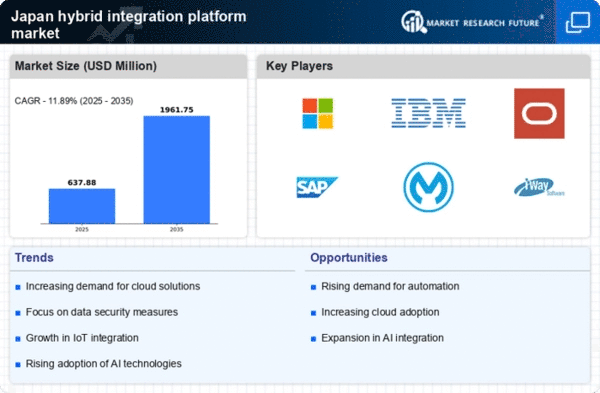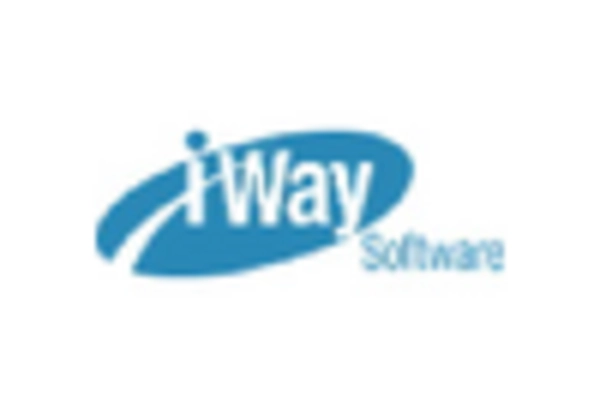Expansion of IoT Ecosystems
The proliferation of Internet of Things (IoT) devices in Japan is significantly influencing the hybrid integration-platform market. With an estimated 1.5 billion IoT devices expected to be in use by 2025, the need for robust integration solutions becomes increasingly critical. Hybrid integration platforms enable organizations to connect and manage these diverse devices, ensuring that data flows seamlessly between them and existing systems. This integration is essential for industries such as manufacturing, healthcare, and smart cities, where real-time data exchange is vital for operational efficiency. Consequently, the hybrid integration-platform market is likely to expand as businesses invest in solutions that can accommodate the complexities of IoT ecosystems.
Rising Demand for Digital Transformation
The hybrid integration-platform market in Japan is experiencing a notable surge due to the increasing demand for digital transformation across various sectors. Organizations are seeking to modernize their operations and enhance customer experiences through integrated solutions. This trend is reflected in the fact that approximately 70% of Japanese enterprises have initiated digital transformation projects, which often necessitate the adoption of hybrid integration platforms. These platforms facilitate seamless connectivity between on-premises systems and cloud applications, thereby enabling businesses to leverage data more effectively. As companies strive to remain competitive in a rapidly evolving digital landscape, the hybrid integration-platform market is poised for substantial growth, driven by this overarching need for transformation.
Growth of E-commerce and Digital Services
The rapid growth of e-commerce and digital services in Japan is significantly impacting the hybrid integration-platform market. As online shopping continues to gain traction, businesses are increasingly reliant on integrated systems to manage inventory, customer data, and payment processing. The e-commerce sector is projected to reach ¥20 trillion by 2025, necessitating efficient integration solutions to handle the influx of transactions and data. Hybrid integration platforms enable seamless connectivity between various e-commerce applications and back-end systems, ensuring a smooth customer experience. This burgeoning market presents substantial opportunities for hybrid integration solutions, as companies strive to enhance their digital service offerings.
Increased Focus on Operational Efficiency
In Japan, organizations are increasingly prioritizing operational efficiency, which is driving the growth of the hybrid integration-platform market. Companies are recognizing that streamlined processes and improved data accessibility can lead to significant cost savings and enhanced productivity. According to recent studies, businesses that implement hybrid integration solutions report up to a 30% reduction in operational costs. This trend is particularly evident in sectors such as finance and logistics, where timely data integration is crucial for decision-making. As firms continue to seek ways to optimize their operations, the hybrid integration-platform market is expected to benefit from this heightened focus on efficiency.
Regulatory Compliance and Data Governance
The hybrid integration-platform market in Japan is also being shaped by the increasing emphasis on regulatory compliance and data governance. With stringent regulations such as the Personal Information Protection Act (PIPA) in place, organizations must ensure that their data handling practices are compliant. Hybrid integration platforms provide the necessary tools to manage data flows securely and transparently, thereby helping businesses adhere to these regulations. As companies navigate the complexities of compliance, the demand for integration solutions that offer robust governance features is likely to rise. This trend underscores the importance of hybrid integration platforms in facilitating secure and compliant data management.
















